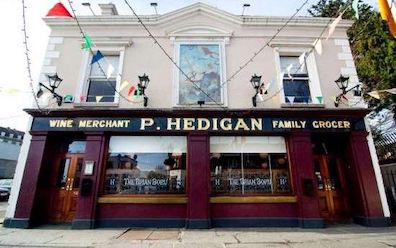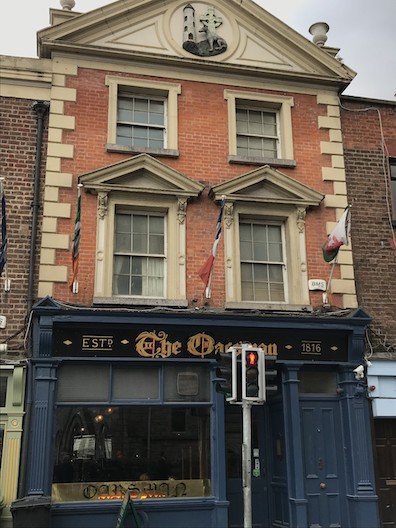The 1904 Dublin through which Bloom starts walking at 9 AM,
not to return for nearly 17 hours, was an exceptionally
homosocial place. Women figured marginally in its public life,
in large part because so much of that life took place in public houses. It is hard to say
how many of these popular gathering places actually banned
females, but women were scarce enough to effectively segregate
the alcoholic thirst and competitive social bonding of men
from the domestic lives of families. Some Victorian and
Edwardian pubs had separate rooms called snugs where women (or
couples, or priests, or policemen sworn to sobriety) could
drink privately, but Joyce does not mention any of these. His
pubs are places for men to gather, and their atmosphere is
jovial and relentlessly masculine. The monopoly is summed up
in Sirens when Miss Douce says that men are
"frightful idiots" and Miss Kennedy replies, "It's them has
the fine times."
The gender divisions were not absolute. In response to the
19th century temperance movement, which cut into business,
many publicans had diversified into groceries, tea, and wine,
advertising themselves as "spirit grocers" or "wine merchants"
and offering shopping in the front of the store. In recent
years grocery store chains and other large firms have taken
most of this business away from the pubs (though some of them
still feature the old language on their shopfronts), but in
1904 the practice was still thriving. Women shopping for
groceries could pick up wine or whiskey in the same shops, and
drink it at home.
Ulysses depicts several such women: the "bent hag" in
Calypso that Bloom sees in front of "Cassidy's,
clutching a naggin bottle by
the neck"; Mrs. Dignam in Circe, "her snubnose and
cheeks flushed with deathtalk, tears, and Tunney's tawny
sherry"; Molly in Penelope, who thinks, "Ill
have to knock off the stout at dinner or am I getting too fond
of it the last they sent from ORourkes was as flat as a
pancake." In these details Joyce shows women drinking from all
the major food groups—hard liquor, wine, beer—and he shows
public houses doubling as package stores. O'Rourke's is the pub that
Bloom passes in Calypso, and Tunney's is mentioned
twice in one section of Wandering Rocks, when Patsy
Dignam thinks of his mother sipping "the superior tawny sherry
uncle Barney brought from Tunney’s," and of his
father's frequent visits to the pub: "The last night pa was
boosed he was standing on the landing there bawling out
for his boots to go out to Tunney’s for to
boose more."
Women who had the inclination and the money to drink
certainly could do so in 1904. In Hades Bloom
commiserates with Martin
Cunningham for having to endure "that awful drunkard
of a wife of his." Mrs. Cunningham has the habit of
regularly "pawning the furniture," probably for money to spend
in spirit shops. Bloom thinks that "she must have looked a
sight that night Dedalus told me he was in there. Drunk about
the place and capering with Martin's umbrella." But this
display took place in the couple's home. Homes, and private
parties in homes, afforded the only real opportunities for
women to drink, while men could find establishments to walk
into on every street, at every hour of the day.
In several of the stories of Dubliners Joyce
explored the tensions between the freedom that men feel in
bars and the constraints they experience when they return
home. "Eveline" tells the story of a young woman who lives in
fear of her violent father and is wearied by "the invariable
squabble for money on Saturday nights," when he was "usually
fairly bad." "A Little Cloud" shows a family man having drinks
with an old acquaintance and feeling frustrated with his
unaccomplished life when he comes home, until he screams in
rage at his infant child and is savagely rebuked by his wife.
In "Counterparts," Farrington's night of drinking ends with
him beating his "little boy" with a stick.
The narrative stream of these three stories flows
uninterruptedly through Ulysses, where the gap
separating men's public lives of drinking from their private
lives of providing for families is visible at many points. In
Lestrygonians Nosey Flynn, sitting in the same pub
where he sat in "Counterparts," comments disapprovingly on
having seen Bloom one day "with a jar of cream in his hand
taking it home to his better half. She's well nourished, I
tell you. Plovers on toast." In Wandering Rocks Dilly
Dedalus buttonholes her father to contribute a penny or two
from his pocketful of drinking money to support his starving
family, which he begrudgingly does: "Get a glass of milk for
yourself and a bun or a something. I’ll be home shortly."
(Dublin remembers John Stanislaus Joyce as a
"street angel, house devil.") In Oxen of the Sun the
hospital's halls resonate with the raucous shouts of drunken
young men while a woman struggles to give birth in her third
day of labor.
Nausicaa presents the perspective of the women who
wait at home for their men to return. Gerty thinks of the
effects of alcohol on her family: "But that vile decoction
which has ruined so many hearths and homes had cast its shadow
over her childhood days. Nay, she had even witnessed in the
home circle deeds of violence caused by intemperance
and had seen her own father, a prey to the fumes of
intoxication, forget himself completely for if there was one
thing of all things that Gerty knew it was that the man who
lifts his hand to a woman save in the way of kindness,
deserves to be branded as the lowest of the low." Later in the
same chapter, Bloom too thinks of what women have to put up
with when their husbands come back from the pub: "Worst of all
at night Mrs Duggan told me in the City Arms. Husband
rolling in drunk, stink of pub off him like a polecat.
Have that in your nose in the dark, whiff of stale boose. Then
ask in the morning: was I drunk last night?"
On this topic as on so many others, Molly Bloom has the last
word. She knows that she is fortunate to have married a man
who, after 17 hours tramping Dublin's streets, has consumed
just one glass of wine and kept a careful mental tally of the
day's expenses. Less prudent, more profligate men intrude
repeatedly in her thoughts: Tom
Kernan "that bit his tongue off falling down the mens WC
drunk in some place or other," Simon Dedalus who "was always
turning up half screwed" at concerts in which he was about to
perform, Professor Goodwin who
"was a patent professor of John Jameson," Paddy
Dignam "Im sorry in a way for him what are his wife and
5 children going to do unless he was insured comical little
teetotum always stuck up in some pub corner and her or her
son waiting Bill Bailey wont you please come home."
Bloom has come home quite late on this unusual day, prompting
Molly to "hope hes not going to get in with those medicals
leading him astray to imagine hes young again coming in at 4
in the morning it must be if not more still he had the manners
not to wake me what do they find to gabber about all night
squandering money and getting drunker and drunker couldnt
they drink water." Even if Bloom has gotten carried away
for once, she is determined not to let it become a regular
thing: "theyre a nice lot all of them well theyre not going to
get my husband again into their clutches if I can help it
making fun of him then behind his back I know well when he
goes on with his idiotics because he has sense enough not
to squander every penny piece he earns down their gullets
and looks after his wife and family goodfornothings."
Pubs proliferated at the dawn of the Industrial Revolution as
havens from dehumanizing workplaces, and it seems that they
quickly became havens from domestic responsibilites as well.
Whether they still perform the latter function today is hard
to say, but the implicit ban on women in most Irish pubs has
now been gone for a good half century. Some traditional pubs
(e.g., John Clarke's in Irishtown, Thomas Maher's in
Waterford, Pat Gleeson's in Kilkenny) remained all-male into
the last few decades of the 20th century, but they were
fighting a rear-guard action in the midst of a full-on
retreat.
A wonderful 1968 video from the archives of the RTÉ,
which can be accessed at https://www.rte.ie/archives/2018/0403/951821-changing-face-of-dublin-pubs/,
shows journalist Paddy Bolger's gruff acknowledgement of a
whole new social scene in the Dublin bars of his time: women
invading the male sanctum, bars becoming "lounges," dark
mahogany surfaces and product-branded mirrors giving way to
glitzy decorations, fancy drinks being sipped so mincingly
that deep swigs of porter suddenly seem gauche, musical acts
spreading like a maniacal cancer, miniskirted thighs displayed
by girls whose fathers should be looking after them,
ridiculous games imported from England. Thanks to Cathal
Coleman for recommending this marvelous video to me.



